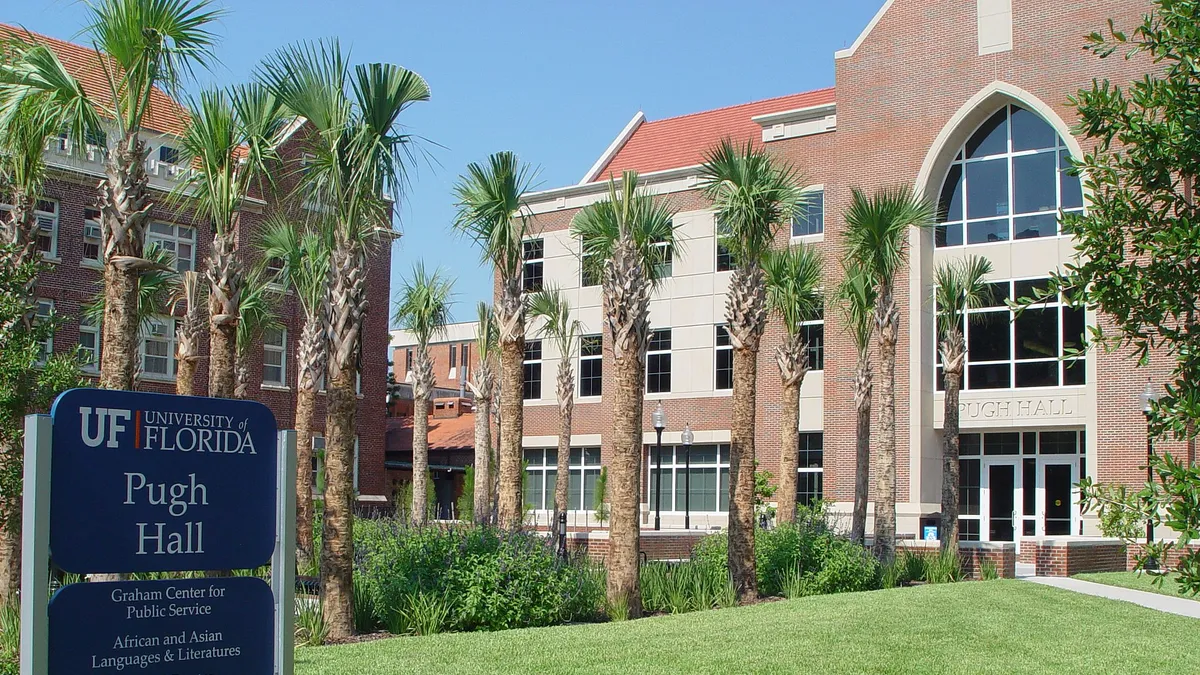Dive Brief:
- Florida's public colleges would be required to change accreditors and then do so again every five years under a new bill introduced in the state's House of Representatives.
- The proposal follows the Southern Association of Colleges and Schools Commission on Colleges, which accredits public institutions in the state, inquiring into potential state political influence at the University of Florida and Florida State University.
- Policy experts argue the bill's terms would be difficult to achieve, as accrediting agencies come in limited numbers, and getting their approval is time intensive.
Dive Insight:
Accreditors ensure the health of academic programming, finances, free inquiry and other components of college campuses. They are also the gatekeepers of federal Title IV student aid funding, but they must be recognized by the U.S. Department of Education or an association, the Council for Higher Education Accreditation.
Seven regional accreditors exist that previously could only approve institutions within a certain geographical range. This changed during the Trump administration, which in 2019 issued a new regulation eliminating those boundaries. The Education Department also loosened accreditors' compliance standards, spurring criticism that it weakened the accreditation system.
The Southern Association of Colleges and Schools Commission on Colleges, or SACSCOC, has twice recently investigated whether partisan pressures are affecting Florida colleges' operations.
It raised concerns in May, when Richard Corcoran, the state's education commissioner, was applying for the Florida State presidency. Corcoran sits on the governing board that approves presidential candidates, which SACSCOC said presented a conflict of interest and clashed with its standards.
More recently, in November, SACSCOC notified U of Florida that it would examine whether political influence affected the university's decision to initially not allow three professors to testify in a lawsuit against the state's new restrictive voting rights law.
The university later relented and said the trio could participate in the case, but they and three other professors at the institution sued over the university's conflict-of-interest policy, which it cited when it barred the academics from testifying.
The new Florida legislation would force public colleges to change accreditors and then find a new one every accreditation cycle. Accreditors usually approve colleges for five years initially, and then renewals can span between five and 10 years.
It would also create a method for colleges to sue accreditors that pursued "retaliatory action" against institutions.
However, colleges can't switch accreditors immediately – applying to a new one can take at least a couple of years, said Judith Wilde, who was a former vice president for recognition at the Council for Higher Education Accreditation, or CHEA.
During that period, institutions would need to simultaneously work with two accreditors in order to maintain access to federal funding: their current accreditor and the one they want to join.
That could be time-consuming, Wilde said. Accreditors during approval and renewal processes send teams out to campuses to interview students and employees and verify parts of their operations, she said.
"Some colleges actually have administrators in central administration they hire only to work on accreditation," Wilde said. "It's not an easy process."
SACSCOC President Belle Wheelan said in an interview the organization's policies require it to start investigations if it receives media reports of colleges' actions that would conflict with its standards.
She said she wasn't aware of the Florida bill before it was made public and that it caught her off guard.
U of Florida and Florida State "have never gotten those kind of inquires before" from the accreditor, which potentially angered them, she said
"They think I'm messing with their business," Wheelan said.
Neither university responded to requests for comment Friday.
Wheelan said SACSCOC is sending officials to U of Florida in March as a part of its investigation and will submit a report to the accreditor's board in June.















